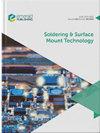不同时效条件对ni改性MWCNTs增强Sn-Ag-Cu复合钎料IMC层生长和抗剪强度的影响
IF 1.7
4区 材料科学
Q3 ENGINEERING, ELECTRICAL & ELECTRONIC
引用次数: 0
摘要
目的研制一种新型的复合焊料,以提高复合焊点的可靠性。纳米颗粒改性的多壁碳纳米管(Ni-MWCNTs)确实可以改善复合焊点的微观结构,提高焊点的可靠性。尽管许多人对Ni MWCNTs的复合焊料进行了深入的研究。然而,没有人研究Ni MWCNTs复合焊料在不同老化条件下的性能。本文在Sn-Ag-Cu(SAC)钎料中添加了Ni-MWCNTs,对复合钎料的物理性能、微观结构和力学性能进行了评价。设计/方法/方法在本研究中,研究了不同老化条件对Ni改性MWCNTs增强SAC复合焊料的金属间化合物(IMC)层生长和剪切强度的影响。与SAC307焊料合金相比,不同含量(0、0.1和0.2 Wt.%)。为了研究复合焊点的时效特性,分别在80°C、120°C和150°C下对焊点进行了时效处理。实验结果表明,Ni MWCNTs的含量影响界面IMC层的形貌和生长。焊料的显微硬度增加,润湿角减小。在中等(120°C)和高温(150°C)下时效后,Cu6Sn5 IMC层的形貌从扇形变为片状,晶粒尺寸变粗。在具有Ni-MWCNTs增强的焊点中观察到以下两种不同的相组成:Cu3Sn和(Cu,Ni)6Sn5。焊点的断口均出现韧性凹坑,凹坑的大小随着时效温度的升高而显著增大。通过生长动力学分析,Ni修饰的MWCNTs在复合焊点中可以有效地抑制原子在焊点中的扩散。简而言之,当Ni MWCNTs的添加量为0.1时 Wt.%时,焊点表现出最佳的润湿性和最高的剪切强度。原创性/价值在本研究中,研究了时效条件对Ni改性MWCNTs增强SAC307复合焊料IMC层的生长和剪切强度的影响。不同含量(0、0.1和0.2)的Ni MWCNT的影响 Wt.%)。本文章由计算机程序翻译,如有差异,请以英文原文为准。
Impact of different aging conditions on the IMC layer growth and shear strength of Ni-modified MWCNTs reinforced Sn-Ag-Cu composite solder
Purpose
The purpose of this paper is to develop a new composite solder to improve the reliability of composite solder joints. Nano-particles modified multi-walled carbon nanotubes (Ni-MWCNTs) can indeed improve the microstructure of composite solder joints and improve the reliability of solder joints. Although many people have conducted in-depth research on the composite solder of Ni-MWCNTs. However, no one has studied the performance of Ni-MWCNTs composite solder under different aging conditions. In this article, Ni-MWCNTs was added to Sn-Ag-Cu (SAC) solder, and the physical properties of composite solder, the microstructure and mechanical properties were evaluated.
Design/methodology/approach
In this study, the effect of different aging conditions on the intermetallic compound (IMC) layer growth and shear strength of Ni-modified MWCNTs reinforced SAC composite solder was studied. Compared with SAC307 solder alloy, the influence of Ni-MWCNTs with different contents (0, 0.1 and 0.2 Wt.%) on composite solder was examined. To study the aging characteristics of composite solder joints, the solder joints were aged at 80°C, 120°C and 150°C.
Findings
The experimental results show that the content of Ni-MWCNTs affects the morphology and growth of the IMC layer at the interface. The microhardness of the solder increases and the wetting angle decreases. After aging at moderate (120°C) and high temperature (150°C), the morphology of the Cu6Sn5 IMC layer changed from scallop to lamellar and the grain size became coarser. The following two different phase compositions were observed in the solder joints with Ni-MWCNTs reinforcement: Cu3Sn and (Cu, Ni)6Sn5. The fracture surface of the solder joints all appeared ductile dents, and the size of the pits increased significantly with the increase of the aging temperature. Through growth kinetic analysis, Ni-modified MWCNTs in composite solder joints can effectively inhibit the diffusion of atoms in solder joints. In short, when the addition amount of Ni-MWCNTs is 0.1 Wt.%, the solder joints exhibit the best wettability and the highest shear strength.
Originality/value
In this study, the effects of aging conditions on the growth and shear strength of the IMC layer of Ni modified MWCNTs reinforced SAC307 composite solder were studied. The effects of Ni MWCNTs with different contents (0, 0.1 and 0.2 Wt.%) on the composite solder were examined.
求助全文
通过发布文献求助,成功后即可免费获取论文全文。
去求助
来源期刊

Soldering & Surface Mount Technology
工程技术-材料科学:综合
CiteScore
4.10
自引率
15.00%
发文量
30
审稿时长
>12 weeks
期刊介绍:
Soldering & Surface Mount Technology seeks to make an important contribution to the advancement of research and application within the technical body of knowledge and expertise in this vital area. Soldering & Surface Mount Technology compliments its sister publications; Circuit World and Microelectronics International.
The journal covers all aspects of SMT from alloys, pastes and fluxes, to reliability and environmental effects, and is currently providing an important dissemination route for new knowledge on lead-free solders and processes. The journal comprises a multidisciplinary study of the key materials and technologies used to assemble state of the art functional electronic devices. The key focus is on assembling devices and interconnecting components via soldering, whilst also embracing a broad range of related approaches.
 求助内容:
求助内容: 应助结果提醒方式:
应助结果提醒方式:


